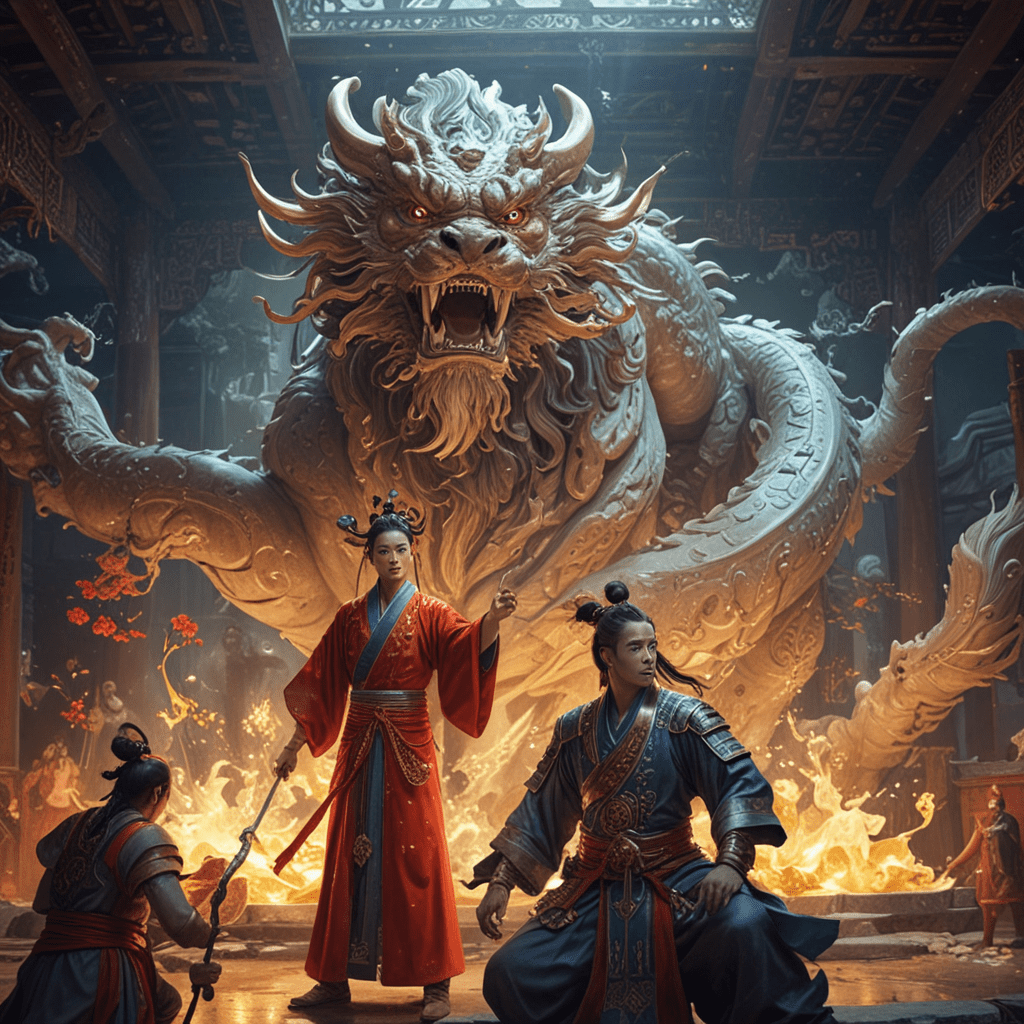**The Influence of Chinese Mythology on Modern Culture**
**I. Introduction**
Chinese mythology, a vibrant tapestry of ancient stories and legends, has profoundly shaped the cultural fabric of China and beyond. Its captivating narratives and enigmatic characters have left an enduring legacy on literature, art, customs, and even contemporary entertainment. This article delves into the rich history of Chinese mythology and its profound influence on modern culture, examining its key elements and exploring its enduring impact on various aspects of society.
**II. The Origin and Evolution of Chinese Mythology**
Chinese mythology is a complex system of beliefs and narratives that has evolved over centuries. Its origins can be traced back to ancient animistic practices and the worship of natural forces. As civilization developed, these beliefs were intertwined with historical events, cultural traditions, and the influence of Confucianism, Daoism, and Buddhism. Over time, Chinese mythology became a vibrant collection of stories that reflected the hopes, fears, and aspirations of its people.
**III. Key Deities and Mythological Figures**
Chinese mythology is home to a vast pantheon of deities and mythical beings. The Jade Emperor, the ruler of the heavens, holds supreme authority. Guanyin, the goddess of mercy, is revered for her compassion and healing powers. Sun Wukong, the Monkey King, is a beloved and mischievous hero known for his extraordinary abilities. These and countless other figures populate the Chinese mythological landscape, each embodying specific attributes and shaping the cultural narratives of the nation.
**IV. Influence on Chinese Literature and Art**
Chinese mythology has served as an inexhaustible source of inspiration for literature and art. Classic works such as the "Journey to the West" and "The Romance of the Three Kingdoms" are deeply rooted in mythological themes. In painting and sculpture, mythical figures are depicted with intricate symbolism and vivid colors. Chinese opera and theater often draw upon mythological stories, capturing the imagination of audiences with their elaborate costumes and dynamic performances.
**V. Impact on Traditional Festivals and Customs**
Chinese mythology has played a significant role in the development of traditional festivals and customs. The Chinese New Year, the most important festival in the Chinese calendar, is rooted in mythological beliefs about the battle between good and evil. The Dragon Boat Festival commemorates the tragic death of the poet Qu Yuan and the legendary efforts to recover his body. These festivals, along with many others, are infused with mythological symbolism and rituals that reflect the enduring influence of ancient traditions.
VI. Influence on Film, Television, and Video Games
In recent decades, Chinese mythology has experienced a resurgence in popularity through its adaptation in modern media. Numerous films and television series have drawn heavily from mythological themes, captivating audiences with their stunning visuals and dynamic storytelling. Video games have also embraced Chinese mythology, creating immersive worlds that allow players to interact with legendary characters and explore mythological landscapes.
VII. Role in Chinese Philosophy and Spirituality
Chinese mythology has been intertwined with Chinese philosophy and spirituality for centuries. The concepts of yin and yang, the five elements, and the mandate of heaven all have roots in mythological beliefs. Daoism, a major Chinese philosophy, draws inspiration from the idea of harmony between humans and the natural world, as reflected in mythological narratives.
VIII. Contemporary Adaptations and Reinterpretations
In contemporary times, Chinese mythology continues to inspire artists and creatives to reinterpret and adapt its stories for new audiences. Modern novels, graphic novels, and animations offer fresh perspectives on classic tales while maintaining their core mythological elements. These adaptations often address contemporary themes such as identity, gender, and the environment.
IX. Global Recognition and Cultural Exchange
Chinese mythology has gained global recognition in recent years, captivating audiences worldwide with its unique and imaginative world. Cultural exchanges and collaborations have facilitated the dissemination of Chinese mythological stories and characters beyond China's borders. Western films and television shows have incorporated elements of Chinese mythology, introducing them to a broader audience.
X. Conclusion
Chinese mythology remains a vibrant and transformative force in modern culture, shaping literature, art, festivals, and entertainment. Its stories, characters, and themes continue to inspire and resonate with people of all ages. As Chinese mythology evolves and adapts to the 21st century, its influence is likely to only grow, ensuring its enduring legacy in the cultural landscape.
FAQs about Chinese Mythology
- What is the most popular Chinese mythological figure?
Sun Wukong, the Monkey King, is one of the most beloved and well-known Chinese mythological figures. - What is the significance of the Chinese New Year?
The Chinese New Year is the most important festival in the Chinese calendar and is rooted in mythological beliefs about the battle between good and evil. - How has Chinese mythology influenced Western culture?
Chinese mythology has influenced Western films, television shows, video games, and literature, introducing its unique characters and themes to a global audience. - What are some contemporary adaptations of Chinese mythology?
Modern adaptations of Chinese mythology include novels such as "The Three-Body Problem" and the animated film "Ne Zha." - How can I learn more about Chinese mythology?
There are numerous books, articles, and online resources available that can provide information about Chinese mythology.
